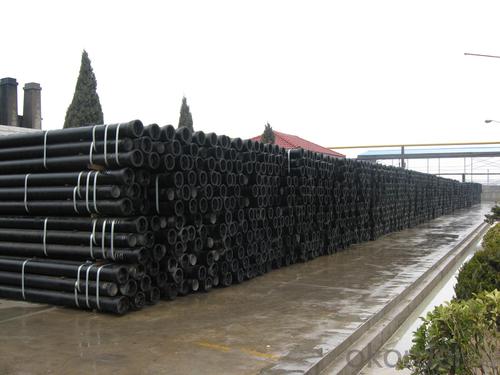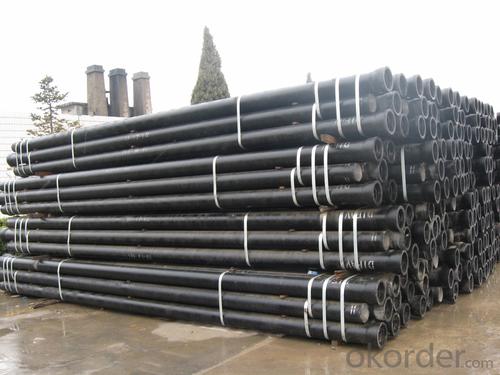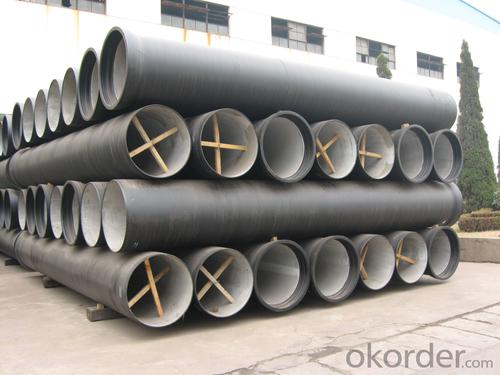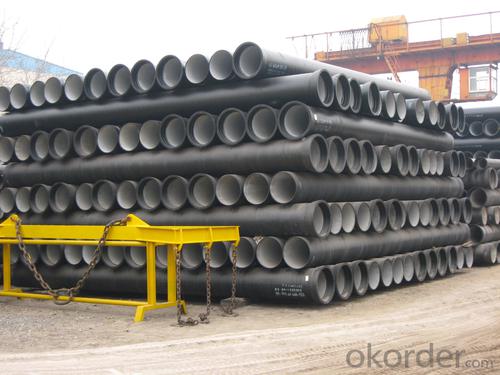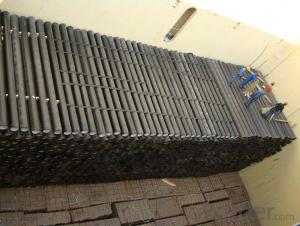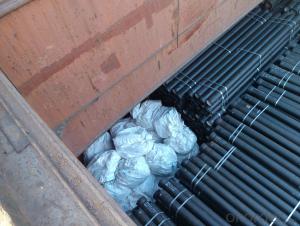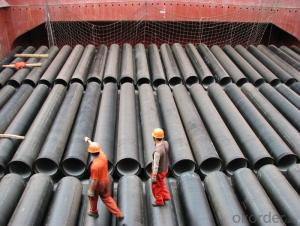DUCTILE IRON PIPE DN800 K8/C/K9
- Loading Port:
- China Main Port
- Payment Terms:
- TT OR LC
- Min Order Qty:
- -
- Supply Capability:
- -
OKorder Service Pledge
OKorder Financial Service
You Might Also Like
Specification:
1) The standard of pipe: ISO2531:1998, K9
2) Effective length: 6m
3) Inner cement line: Portland cement line as per ISO4179
4) Zinc coating: at least 130g/m2 as per ISO8179
5) Bitumen painting: at least 70um as per ISO8179
6) With 100% quantity of NBR ring, or SBR ring, or EPDM ring as per ISO4633
7) DN80mm-800mm
8) High strength, lighter than grey iron, good corrosion resistance, no furring, small flow resistance, easy fixing, long life tome about 100 yeas
9) Produced by Hangzhou chunfeng machine
10) Checked by automatic inspection equipment
11) Composition:
Chemical composition | | | | |||
Chemical composition | Ductile Cast Iron Pipe (%) | Grey iron pipe (%) | Steel pipe (%) | | | |
C | 3.5-4.0 | 3.2-3.8 | 0.1-0.2 | | | |
Si | 1.9-2.6 | 1.4-2.2 | 0.15-0.4 | | | |
Mn | 0.15-0.45 | 0.4-0.6 | 0.3-0.6 | | | |
P | ≤0.06 | ≤0.3 | 0.02-0.03 | | | |
S | ≤0.02 | ≤0.1 | 0.02-0.03 | | | |
Mg | 0.03-0.06 |
|
| | | |
12) Feature:
Mechanical properties | | | | |||
| Ductile Cast Iron Pipe | Grey Iron Pipe | Steel Pipe | | | |
Tensile Strength(Mpa) | ≥420 | 150-260 | ≥400 | | | |
Yield Strength(Mpa) | ≥300 | No Confirmation | No Confirmation | | | |
Bending Strength(Mpa) | ≥590 | 200-360 | ≥400 | | | |
Elongation (%) | ≥10 | Neglected | ≥18 | | | |
Brinell Hardness(HBS) | ≤230 | ≤230 | About 140 | | | |
13) T type mechanical joint
14) Packing: in bulk or container
- Q: Can ductile iron pipes be used for underground steam distribution systems?
- Yes, ductile iron pipes can be used for underground steam distribution systems. Ductile iron has excellent strength, durability, and resistance to high temperatures, making it suitable for carrying steam underground. Additionally, its corrosion resistance properties ensure a longer lifespan and reduced maintenance costs.
- Q: Can ductile iron pipes be used for industrial applications?
- Yes, ductile iron pipes can be used for industrial applications. Ductile iron pipes offer excellent strength and durability, making them suitable for various industrial sectors such as water and wastewater treatment plants, chemical processing facilities, and power plants. They can withstand high-pressure conditions, resist corrosion, and have superior impact resistance, making them an ideal choice for industrial applications.
- Q: Are ductile iron pipes suitable for use in cold climates?
- Ductile iron pipes are well-suited for cold climates due to their exceptional strength and durability. This makes them a reliable choice for various applications, such as water supply systems, sewage systems, and industrial piping. In freezing temperatures, ductile iron pipes are highly resistant to cracking or breaking. This is because of their unique metallurgical composition and structure. They possess a high tensile strength and can endure the expansion and contraction resulting from freezing and thawing cycles. Additionally, their smooth internal surface prevents ice or sediment buildup, ensuring efficient flow and reducing the risk of blockages. Overall, ductile iron pipes are a dependable and appropriate option for use in cold climates.
- Q: What are the different joint restraint systems available for ductile iron pipe?
- Ductile iron pipe offers several options for joint restraint systems. These systems aim to prevent movement and separation at the pipe joints, ensuring a secure and leak-free connection. The commonly used joint restraint systems for ductile iron pipe include the following: 1. Mechanical Joint Restraint: This system involves a joint adapter and a restraining gland. The joint adapter is bolted to the pipe, while the restraining gland is bolted to the adjacent pipe or structure, preventing any movement. 2. Push-on Joint Restraint: This system uses a push-on joint along with a restraining gland that is bolted to the pipe or structure. The gland grips the pipe, providing axial restraint and preventing movement. 3. Flex-Ring Joint Restraint: This system employs a flexible rubber ring installed inside the pipe's bell. The ring expands against the pipe, ensuring a tight and secure connection by providing radial restraint. 4. Harness Joint Restraint: This system includes a harness wrapped around the pipe and connected to a restraining gland. The harness offers both axial and radial restraint, keeping the pipe in place. 5. Grip-Lock Joint Restraint: This system involves a wedge-shaped restraint inserted into the pipe's bell. The wedge expands and locks into place, providing both axial and radial restraint. 6. Restrained Joint System: This system combines mechanical and flexible joint restraints. It typically includes a mechanical joint adapter, a flexible joint restraint, and a restraining gland, offering both axial and radial restraint. Engineers typically specify these joint restraint systems based on factors like pipe diameter, operating pressure, and soil conditions. Each system has its own advantages and limitations, and the selection depends on the specific project needs and constraints.
- Q: How do ductile iron pipes handle heavy traffic loads?
- Ductile iron pipes possess exceptional durability and have the ability to effortlessly withstand heavy traffic loads. This is primarily attributed to their remarkable strength and flexibility. The incorporation of graphite nodules in the composition of ductile iron allows for greater flexibility compared to traditional cast iron pipes. This enhanced flexibility empowers the pipes to endure substantial traffic loads, including the weight of vehicles traversing over them. Moreover, ductile iron pipes exhibit an elevated load-bearing capacity, enabling them to bear significant weights without experiencing any deformation or structural failure. Consequently, they are well-suited for deployment in areas characterized by heavy traffic, such as highways, bridges, and industrial sites. Furthermore, ductile iron pipes showcase exceptional resistance to external forces, such as vibrations and impacts. These pipes can effectively absorb and distribute these forces across the entire pipe network, thereby averting any potential damage and preserving the overall structural integrity. In conclusion, ductile iron pipes are explicitly engineered to manage the demands imposed by heavy traffic loads. Their strength, flexibility, and load-bearing capacity render them a dependable choice for infrastructure projects where durability and longevity are of utmost importance.
- Q: Are ductile iron pipes resistant to external loads?
- Yes, ductile iron pipes are generally resistant to external loads. Ductile iron is a type of cast iron that has been treated with additives such as magnesium and cerium to make it more flexible and durable. This increased flexibility allows the pipes to withstand high levels of external pressure and stress without cracking or breaking. Ductile iron pipes are commonly used in applications where they are exposed to heavy loads, such as underground water distribution systems, sewer lines, and industrial pipelines. These pipes have been proven to have excellent resistance to external loads, making them a reliable choice for various infrastructure projects.
- Q: How do ductile iron pipes handle differential settlement?
- Ductile iron pipes have the ability to handle differential settlement due to their inherent flexibility and strength. The material's ductility allows the pipes to withstand minor ground movements and settlement without causing significant damage or failure. The pipes can flex and adjust to the changing ground conditions, reducing the risk of cracks or breaks. Additionally, the inherent strength of ductile iron pipes helps distribute the load evenly, minimizing the impact of settlement on the overall integrity of the pipeline system.
- Q: How are ductile iron pipes protected against external impact or loading?
- Ductile iron pipes are protected against external impact or loading through various methods. One common method is to apply a protective coating or wrapping on the pipes, which helps to prevent corrosion and reduces the risk of damage from external forces. Additionally, the pipes are often designed with a thicker wall thickness to enhance their strength and resistance to external impact. Furthermore, the installation of appropriate bedding and backfill materials around the pipes provides additional support and protection against external loading. Regular inspections and maintenance practices also play a crucial role in ensuring the long-term durability and protection of ductile iron pipes.
- Q: Can ductile iron pipes be used for river crossings?
- Yes, ductile iron pipes can be used for river crossings. Ductile iron is a strong and durable material that can withstand the stresses and pressures of being installed underground and crossing rivers. It is commonly used in water and sewage systems, including river crossings, due to its resistance to corrosion and its ability to handle high water pressure.
- Q: Are ductile iron pipes resistant to frost heave?
- Yes, ductile iron pipes are generally resistant to frost heave due to their strong and flexible nature.
Send your message to us
DUCTILE IRON PIPE DN800 K8/C/K9
- Loading Port:
- China Main Port
- Payment Terms:
- TT OR LC
- Min Order Qty:
- -
- Supply Capability:
- -
OKorder Service Pledge
OKorder Financial Service
Similar products
Hot products
Hot Searches
Related keywords




